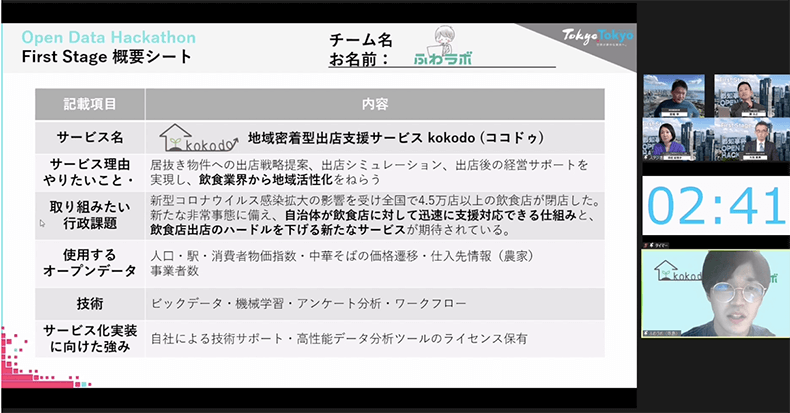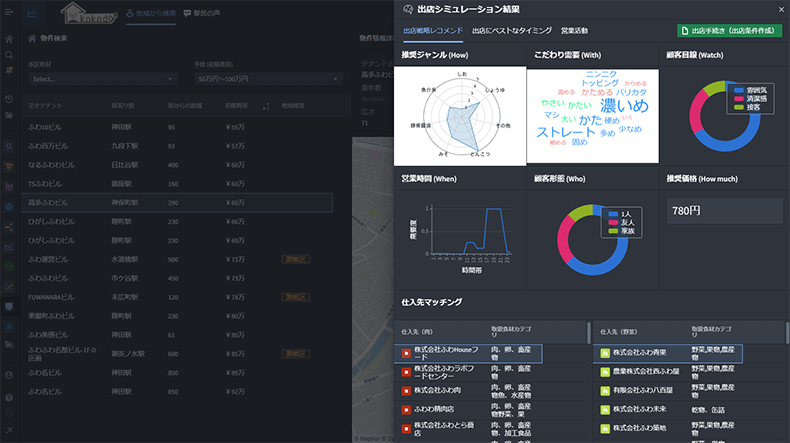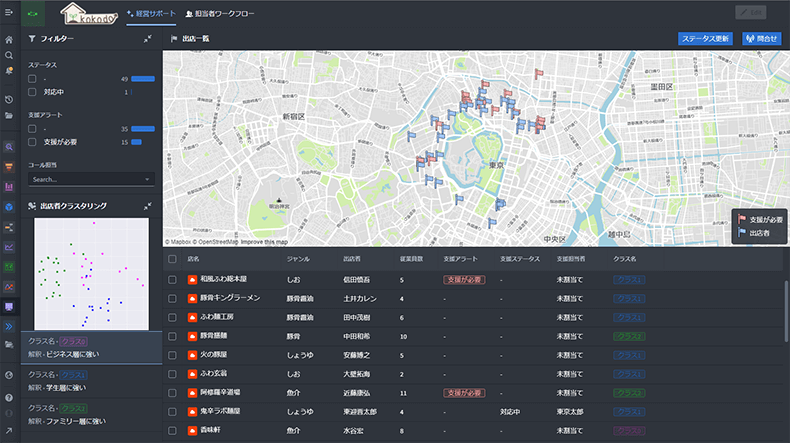- Contents
In January 2022, kokodo (tentative name), a community-based restaurant opening service developed by Fujitsu's data science team, entered the final stage of the Tokyo Governor's Cup Open Data Hackathon. This project is based on a plan to use data to support the opening of restaurants, which are suffering from the effects of the Covid-19 pandemic. To make the world more sustainable, data must be given meaning to enable smooth decision-making. This will help to solve social issues. In this article, Fujitsu's concept of "data-driven" will be introduced and examples of specific initiatives provided.
Forget About Intuition, Experience, and Grit! Making Data-driven Decisions

By 2025, the total amount of data generated worldwide is projected to be 163 ZB (zettabytes), about 10 times the amount generated in 2016. The amount of data that can be handled is increasing each year, and is growing in complexity and volume. For the world to continue sustainable growth, transformation through the use of data and technology is essential. To this end, Fujitsu believes that it is necessary to provide services that integrate all kinds of data, regardless of whether this is from the private or public sector, for the benefit of consumers.
In addition, the environment surrounding us is also undergoing drastic changes, such as environmental issues and the Covid-19 pandemic. By adding background and meaning to the data that is collected and turning this into information that is valuable to society, it is possible to realize management decisions and swift decision-making that are based on data rather than experience or intuition. This is the core of Fujitsu's concept of "data-driven".
Swift, data-driven decision-making drives the creation of new business. It will also streamline business processes, increase product value, and transform the customer experience. Moreover, as data is used beyond companies, it can transform industries and help realize sustainable development goals. In this way, data-driven is the catalyst that will spark innovation throughout society.
The Data Has Changed: Supermarkets and Election Coverage
Here are two examples that show the advantage of data-driven analytics.

The first is with the company Okuwa. Okuwa operates supermarkets, shopping centers, and discount stores in the Kinki and Tokai regions in Japan that are tailored to regional and customer characteristics. The company set out to improve its forecasts for customer numbers, which is the basis for ordering, in order to reduce its waste and opportunity losses. Fujitsu introduced AI (artificial intelligence) to forecast customer numbers, a process which had previously relied on the intuition and experience of store managers. We also quantified weather information, event and sales promotion information, and customer service knowledge, and used the expertise of our demand forecasting consultants in order to create a numerical value that could be used to predict the impact of external factors on customer numbers. By doing so, we were able to forecast the number of customers that would visit stores with a high degree of accuracy. In fact, the AI-powered forecasts were approximately two times more accurate than those made by the store managers. This has helped to optimize order volume and reduce losses such as product disposal and discounting.
The second example is an initiative for transforming election reporting. Fujitsu conducted a joint data analysis project with Nikkei Inc. to provide a data analysis perspective for its election reporting.
In this project, using the expertise of the Nihon Keizai Shimbun, we conducted an unprecedented analysis by cross-referencing data on past election results with data on regional characteristics specific to the constituency and the attributes of the council members. Specific examples of our analysis are shown below.

Since the introduction of the parallel constituency proportional representation system in Japan in 1996, there have been eight house of representatives elections through 2017. Firstly, we wanted to focus on what allowed the winning candidates to win their seats. It is said that the conditions that determine the strength of an election candidate are “jiban” (ground strength), “kanban” (name recognition), and “kaban” (financial strength). We sought to find out from data whether this belief is actually true or not.
Hereditary candidates are commonly considered to have an advantage because they inherit ground strength and name recognition from their predecessors. To examine the relationship between ground strength and winning, all candidates were sorted into the two categories of hereditary candidates and non-hereditary candidates. We found that 13% of all candidates were hereditary, and that their win rate was 80%. On the other hand, non-hereditary candidates had a win rate of 30%, indicating that the non-hereditary candidates were at a disadvantage.
The next factor we looked at was financial strength. Based on a publication by the Ministry of Internal Affairs and Communications, we calculated the amount of expenditure per voter in each candidate's constituency and categorized this into six 10-yen increments. We found that candidates who spent between 0 and 10 yen won only 4% of the vote, 10-20 yen won 35%, 20-30 yen won 57%, and 30-40 yen won 62%. Here, the gradual increase in the win-rate confirms that candidates with strong financial resources have an advantage.
In addition, we also used the variation coefficient to analyze "swing states," where the winning party tends to change like a pendulum, to help predict the outcome as an area that reflects the election climate. We also calculated the "electoral break point," which is the amount of money spent to make it easier to win the election.
These results have been reported in the Nihon Keizai Shimbun's "Chart Speak" series and other publications. Traditionally, election coverage in Japan has focused on reporting results, with only a small proportion of coverage analyzing voter behavior, but this project has allowed us to verify with data what reporters had previously understood firsthand. In the future, we aim to add new value by not only reporting on events, but also by adding deep insights to election reporting through in-depth coverage of findings obtained as a result of analysis. By doing so, we hope to contribute to the improvement of the subscribers' and voters' interest in and willingness to participate in politics.
A Support Service That Fully Supports Prospective Restaurant Owners
 The final stage of the Tokyo Governor's Cup Open Data Hackathon
The final stage of the Tokyo Governor's Cup Open Data Hackathon
Fujitsu entered the Tokyo Governor's Cup Open Data Hackathon in which participants propose and develop digital services to solve administrative issues by utilizing Tokyo Metropolitan Government's open data. In this development event, engineers and planners compete by bringing their technologies and ideas to develop the best applications and other products in a short period of time.
Fujitsu has developed a prototype for a community-based support service for opening new restaurants called kokodo. The idea is to be able to facilitate decision-making by prospective restaurant operators and enable local governments to provide rapid support to restaurants.
Due to the Covid-19 pandemic, more than 45,000 restaurants in Japan have been forced to close. Opening a restaurant has become a very difficult hurdle for business owners.
To solve this problem, we used open data to create a dashboard that helps business owners determine where in Tokyo to open a ramen restaurant, and with what flavor, for their business to be successful. For example, the dashboard suggests areas to open stores based on budget, menu prices, and income/expense models, as well as ramen flavors, business hours, and the timing for opening new stores. This allows prospective restaurant owners to change from making decisions based on "gut instinct" and "experience" to rational decision-making based on data. And by managing tasks through a workflow of application procedures necessary for opening new stores, the service helps reduce the work hours needed for prospective store owners to complete administrative procedures. In addition, local government can also share data with ramen stores that request assistance, enabling them to respond to issues promptly.
 An example of a dashboard for a prospective restaurant. It allows the restaurant owner to coordinate store opening strategies using data about the local area’s characteristics.
An example of a dashboard for a prospective restaurant. It allows the restaurant owner to coordinate store opening strategies using data about the local area’s characteristics.
 An example of a dashboard for local government. Stores in need of assistance can be identified from the data.
An example of a dashboard for local government. Stores in need of assistance can be identified from the data.
The conditions surrounding society are constantly changing and new challenges are constantly emerging. Fujitsu will continue to promote wide-ranging initiatives to solve issues faced by consumers and society through the use of data and technology.




